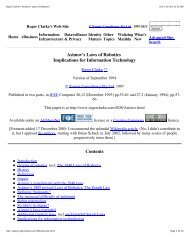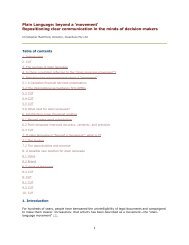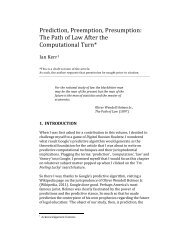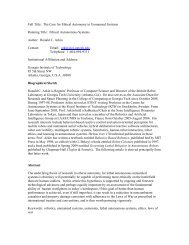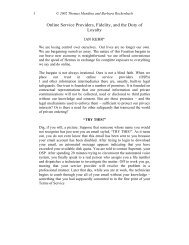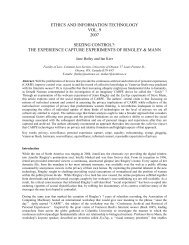Materializing Morality: Design Ethics and Technological Mediation.
Materializing Morality: Design Ethics and Technological Mediation.
Materializing Morality: Design Ethics and Technological Mediation.
You also want an ePaper? Increase the reach of your titles
YUMPU automatically turns print PDFs into web optimized ePapers that Google loves.
Verbeek / <strong>Materializing</strong> <strong>Morality</strong> 369<br />
role in the actions of their users places mediation at the heart of ethics.<br />
<strong>Ethics</strong>, after all, is about the question of how to act, <strong>and</strong> technologies appear<br />
to give material answers to this question. Ethical questions regarding the<br />
design of technologies are thus not limited to questions about the goals<br />
for which technologies are designed <strong>and</strong> applied or to the quality of their<br />
functioning.<br />
When technologies are inherently moral entities, this implies that designers<br />
are doing “ethics by other means”: they materialize morality. Usually, this<br />
“doing ethics” happens in an implicit way. Engineers design a new technology<br />
with specific functionalities in mind, without explicitly aiming to<br />
influence the actions <strong>and</strong> behavior of users. The question, therefore, is how<br />
considerations regarding the mediating role that the technology-in-design<br />
will eventually play in society could be integrated in the design process.<br />
There are two possible ways to take technological mediation into account<br />
during the design process. A first, minimal option is that designers try to assess<br />
whether the product they are designing will have undesirable mediating capacities.<br />
A second possibility goes much further: designers could also explicitly<br />
try to build in specific forms of mediation, which are considered desirable.<br />
<strong>Morality</strong> then, in a sense, becomes part of the functionality of the product.<br />
Moralizing Technologies<br />
The latter direction was taken by the Dutch philosopher Hans Achterhuis<br />
(1995, 1998), who translated Latour’s analysis of scripts into a plea for an<br />
explicit “moralization of technology.” Instead of moralizing only other people<br />
(“do not shower too long,” “buy a ticket before you enter the subway”),<br />
humans should also moralize their material environment. To a water-saving<br />
showerhead, the task could be delegated to see to it that not too much water<br />
is used when showering, <strong>and</strong> to a turnstile, the task to make sure that only<br />
people with a ticket can enter the train.<br />
Achterhuis’s plea for a moralization of technology received severe criticism<br />
(cf. Achterhuis 1998, 28-31). In the debate that arose around this issue<br />
in the Netherl<strong>and</strong>s, two types of arguments were brought in against his<br />
ideas. First, human freedom was thought to be attacked when human<br />
actions are explicitly <strong>and</strong> consciously steered with the help of technology.<br />
This reduction of human freedom was even perceived as a threat to human<br />
dignity; if human actions are not a result of deliberate decisions but of<br />
steering technologies, then people were thought to be deprived of what<br />
makes them human. Moreover, if they are not acting in freedom, their<br />
Downloaded from sth.sagepub.com at QUEENS UNIV LIBRARIES on November 30, 2011



